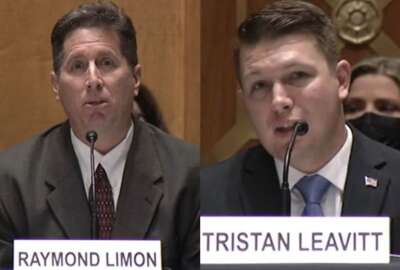An impending long recess will force a lot of action in Congress this week
From a supreme court confirmation vote to Russian misbehavior, the House and Senate have a lot to do in the coming week. And there's considerable time pressure to...
Best listening experience is on Chrome, Firefox or Safari. Subscribe to Federal Drive’s daily audio interviews on Apple Podcasts or PodcastOne.
From a supreme court confirmation vote to Russian misbehavior, the House and Senate have a lot to do in the coming week. And there’s considerable time pressure to get it done. The Federal Drive with Tom Temin got the outlook from Bloomberg Government deputy news director, Loren Duggan.
Interview transcript:
Tom Temin: Loren, let’s start with,well, let’s start with a schedule that’s kind of forcing the hand of Congress to get some things done this week.
Loren Duggan: That’s right. Congress, both chambers, the House and the Senate are about to head out on a two week break after they finish their work. It’s traditional around the spring holidays, Easter, Passover, they often take that period off. Also school breaks as well for people to balance that. So anytime there’s a recess like that, Congress feels pressure to get some things done. There aren’t necessarily, you know, deadlines and statute that are driving this right now. But it’s more some of the political pressure to get some things done before they head out for those two weeks, especially with, as you mentioned, the Russian war in Ukraine and also things like COVID-19, that are still hanging out there and a concern to lawmakers.
Tom Temin: Sure. And AOC has to stock up on matzah and herring so she can get herself through, you know, Passover, in good form. And let’s talk about the Ketanji Brown Jackson confirmation vote, that’s all gonna look like it’s wrapping up.
Loren Duggan: it could be done by this the end of this week for sure. If they get all the votes and run through all that they might have to take. So it’s gonna start this morning at the Senate Judiciary Committee, which will hold a vote on her nomination, that’s traditional, and they had hearings a couple weeks ago. And all that’s in question here is, will there be any break in the vote? It’s possible that this vote could be deadlocked between Democrats and Republicans, that doesn’t block the nomination, because in this Senate, that is 50/50, they have an arrangement that anything that’s a tied vote can be brought to the floor, if there’s a majority that agrees to it. So even if this vote is deadlocked, we’ll probably see a quick vote that we’ll see the Democrats pull that nomination out of the committee, bring it to the floor, then we’ll have the traditional round of cloture votes and confirmation votes, which could take till the end of the week, but by the end of the week, we could have a new justice, although one who may not be seated until much later because Stephen Breyer is still finishing out this term.
Tom Temin: Right, yes.
Loren Duggan: But this is a, anytime they have a vote like this is a big deal in the Senate. And this will be no exception.
Tom Temin: They won’t start vacuuming under his chair just quite yet to give them a chance to clear out there. And other votes. I wanted to ask you about Cathy Ann Harris, to be the chair of the Merit Systems Protection Board. And the third member of the quorum has been there for a few weeks now. And also Susan Tsui Grundmann, formerly of the MSPB, by the way, to be a member of the Federal Labor Relations Authority, the cloture and move and limiting debate votes on those two have been really close, surprisingly close. And so that could also invoke the vice president possibly?
Loren Duggan: Well, they were close, I believe one was 50 to 48 on Harris, but the other one was like 49 to 48, but those were both majorities to get them through. So there seems to be enough support to cut off the bait and have the vote. Now, they have these cloture votes last week, but did not take the actual confirmation votes. There’s an arrangement that when the two leaders agree that can bring these votes and hold them, so they might wait until when they have everybody they need if they do need vice president Harris’s vote for some reason, she’d be on hand to do it, or they make sure that there was a hole in her schedule to get her up there. But it seems like those nominations having been stalled for a little while and even in the the Grundmann vote that you mentioned, she was scheduled at one point, pulled back and then rescheduled more recently to have her cloture vote and then set up that confirmation vote. So you know, these nominations percolate for a while, and then action can happen pretty quickly. When everything lines up.
Tom Temin: Yes, it would be almost revolutionary for the government to have a fully formed MSPB with all three members seated and operating. And also the Russian deal. I mean, there was money authorized for earlier last month to get some weapons and arms and so forth to Ukraine. What else is going on congressionally in that front?
Loren Duggan: Well, there’s two bills that the House passed last month that are waiting action in the Senate and the Senate has been trying to figure out how to respond. One of them deals with the oil and energy ban. It’s kind of a codification of what President Biden did by his own powers that he has. And the other one is to change the trade status of Russia and Belarus. Those bills have kind of been stalled in the Senate, as they figured out, do we combine them? Do we do one and not the other and also how they handle some human rights language that’s in actually both of those bills. And presumably they only do it once in the future. But this is to extend something known as the Global Magnitsky Human Rights Act, which is some sanctions authority that the administration has is supposed to sunset, this would remove the sunset, but also broaden the potential powers in a way that some Republicans in particular were uncomfortable with. So if they can square all that, there’s a chance that we could see the Senate and maybe if necessary, the House vote on that before they leave, because, you know, two weeks is a long time when this is going on. And I think they would like to come to some sort of consensus and action on that if they could.
Tom Temin: We’re speaking with Loren Duggan, deputy news director at Bloomberg Government. And the federal bureaucracy and the federal contracting community are looking at what’s going to happen if they can reconcile the House and Senate competitive and competitive with China bills, because there’s a lot of cybersecurity money and activity in those bills, but they just haven’t been reconciled yet, is that on the horizon soon?
Loren Duggan: The formation of the conference committee that will do the negotiation, that’s probably what we’ll see finalized this week, there were some steps taken last week with the Senate passing the the House bill with its language in it. So they can have these formal talks in the house agreeing to set up the official talks. So we’re waiting to see who gets named to that. And then they’ll start meeting at some point. It may not be before this upcoming recess, maybe it will be after that. But there is some impetus to get this done. And it could be done on a bipartisan basis.
As you mentioned, there some money that would go out to chip manufacturers in the country to help increase the domestic production of semiconductors. And then there’s authorizations which would require later appropriation action for things like NISC, NSF and other science agencies. So there is money directly. And also maybe eventually, if it’s an authorization for a number of agencies to help with competition with China and get a handle on some of the supply chain issues that a lot of people are worried about, and that members of Congress want to see something done about.
Tom Temin: And finally, there’s still COVID interest. I know some members have asked the administration for details on the federal employee return to the office plan. But anything else that could happen with what looks like maybe another resurgence of a new wave or a new variant?
Loren Duggan: Well, the administration had requested and Congress debated including in that omnibus spending package that was signed last month, some money for COVID-19. They couldn’t agree on the package of offsets. So that was pulled out of the omnibus and talks have continued between the House and the Senate. What we may see this week is a slimmer package that perhaps the Senate can come to agreement on, sent to the House. Steny Hoyer (D-Md.) had said in a colleague or letter to his colleagues that if they got a bill like that from the Senate, they’d consider it and maybe even pass it before they left for the recess. So we could see another infusion of money possibly offset by canceling other money that was appropriated in the past but not spent. So I wouldn’t be shocked if we see something there. Because there are some concerns about things like vaccines and issues like that. So if they, again that that two week deadline, you may not want to wait two weeks, at least many lawmakers may not want to so that could again force action on that issue.
Tom Temin: And by the way, the Congress itself is reopening to the public to some degree would that continue even though they’re not in session? Or maybe even you could see more? If they’re not in session? The public?
Loren Duggan: Perhaps. Yeah, perhaps. I mean, they opened up to more tours last week, which is, you know, interesting to see school groups and groups of people with their lawmakers or with lawmakers staff going around the Hill. So you know, the Hill is starting to come back alive just like other places in Washington, D.C. So we’ll see how that continues. There’s a graduated plan for the rest of the year to open it up more and more, so we’ll be watching that as well.
Tom Temin: Well, maybe the Botanical Gardens could move that stinky plant or something that one that smells bad and put that in the rotunda and that’ll keep visitors away. Loren Duggan is Deputy news director at Bloomberg Government. Thanks so much.
Loren Duggan: Thank you.
Copyright © 2025 Federal News Network. All rights reserved. This website is not intended for users located within the European Economic Area.
Tom Temin is host of the Federal Drive and has been providing insight on federal technology and management issues for more than 30 years.
Follow @tteminWFED






